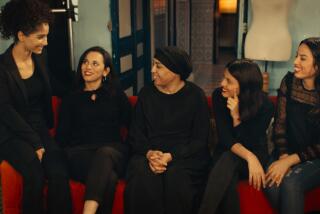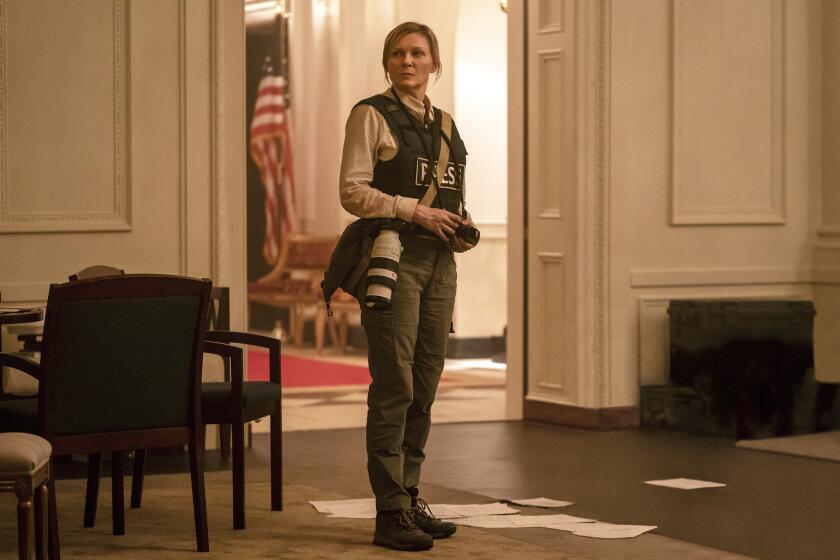Review: ‘24 Days’ a gripping, anguished account of a kidnapping
Knowing the outcome behind the true-life tragedy “24 Days” doesn’t diffuse the horror, the tension or the sadness of watching one family’s drama unfold day after agonizing day when a son is kidnapped and hope dies.
French director Alexandre Arcady, who wrote the screenplay with Emilie Freche and Antoine Lacomblez, brings a gritty, bare-bones approach to the story of Ilan Halimi, a 23-year-old Parisian taken and tortured in 2006 by a group that would come to be known as the Gang of Barbarians, mostly consisting of African immigrants. Freche co-wrote a book on the real-world events with Ilan’s mother, Ruth.
The film opens in late January of that year on an ordinary Friday. Ilan (Syrus Shahidi), part of a close-knit family, slips out to meet a young woman before his mother, Ruth (Zabou Breitman), has even cleared the Shabbat table.
The young woman, it turns out, is a decoy and within hours he’s bound, beaten and being held in a small apartment, while the kidnapping mastermind, Fofana (Tony Harrisson), begins the first of 700 calls to demand a ransom for Ilan’s return.
The film adopts something close to a documentary, rather than dramatic, style, moving among three points of view: The kidnappers, with glimpses of the torture Ilan is subjected to and the growing rage of Fofana as none of his increasingly irrational demands is met. A family that grows more desperate as time goes by, their conversations circling back to what is not being done, what should be done. And the police, driven by good intentions but bad instincts, at one point stopping, then releasing, Fofana, who also traveled easily between France and the Ivory Coast during the time Ilan was held.
Though it is clear where Arcady’s sentiments lie, the filmmaker, who has made cultural and political conflicts his métier, allows the real events to propel the film along. The pace slowly increases until it reaches a stomach-churning level as everything begins to fall apart.
As the film shifts among the kidnappers, the police and the family, our understanding emerges long before theirs, making it easier to grasp early on just how badly everything is going. Fofana is angry and unbalanced. The gang that carries out his bidding is mostly impoverished teens. The police misjudge the case many times. Not until a local rabbi gets a chilling message from the group with claims they have “kidnapped a Jew” does the specter of anti-Semitism arise.
Ilan’s father, Didier (Pascal Elbe), mostly distant since his divorce years ago from Ruth, becomes the main conduit for the negotiations. He takes the kidnappers’ calls and tries to follow instructions from the police, headed by Commandant Delcour (Jacques Gamblin), second-guessing them and himself.
Police were roundly criticized in the aftermath in real life. The filmmaker, who was able to shoot inside the precinct building, captures their certainty and their confusions. Perhaps the greatest miscalculation made by authorities was in not taking the anti-Semitic connection seriously. In a sense, it meant they were looking in all the wrong places for all the wrong people, believing the motive was only money versus the hate crime it also turned out to be.
There are scenes as the family tries to raise the ransom, but the sense of their modest means is underscored more by the surroundings. The color palette is monotone, bordering on dreary. The restrained work of director of photography Gilles Henry, set designer Tony Egry and costume designer Eric Perron extends the mood.
What carries the film is the interplay between the parents — estranged for so long, now trying to set aside differences to ensure their son’s survival. Elbe wraps the father in a cloak of guilt that deepens with the passing days. Breitman seems to live inside a constant state of anguish and frustration. The Cesar-winning actress brings that ache to heartbreaking life with a great deal of nuance. There are no hysterics, just pain.
By the time Fofana breaks, it is too late. Ilan is discovered near a railway track where Fofana dumped him, naked and badly wounded from his time being held. He died on the way to the hospital.
The coda that details the arrest and prosecution of the gang is dispensed with briefly with title cards.
The filmmaker has said one of his main reasons for doing the film was to remind people of the victims, not the headline-grabbing murderers. He bookends the film with Ilan — a carefree young man embracing life at the beginning, his body being exhumed, destined for burial in Israel at its end. “24 Days” makes it impossible to forget.
------------------------
‘24 Days’
Not rated
Running time: 1 hour, 18 minutes; French with English subtitles
Playing: Laemmle’s Music Hall, Beverly Hills
More to Read
Only good movies
Get the Indie Focus newsletter, Mark Olsen's weekly guide to the world of cinema.
You may occasionally receive promotional content from the Los Angeles Times.







